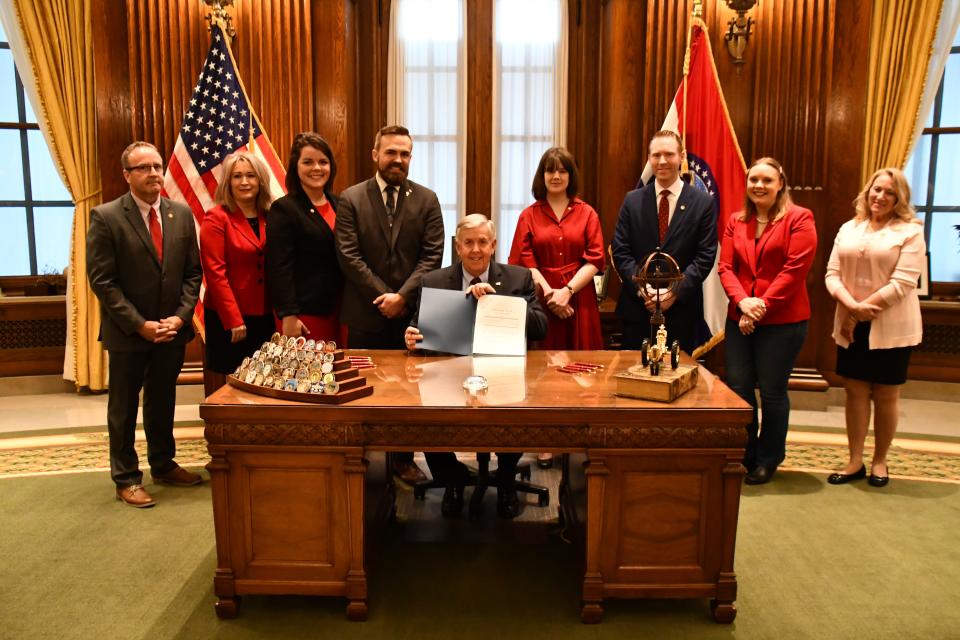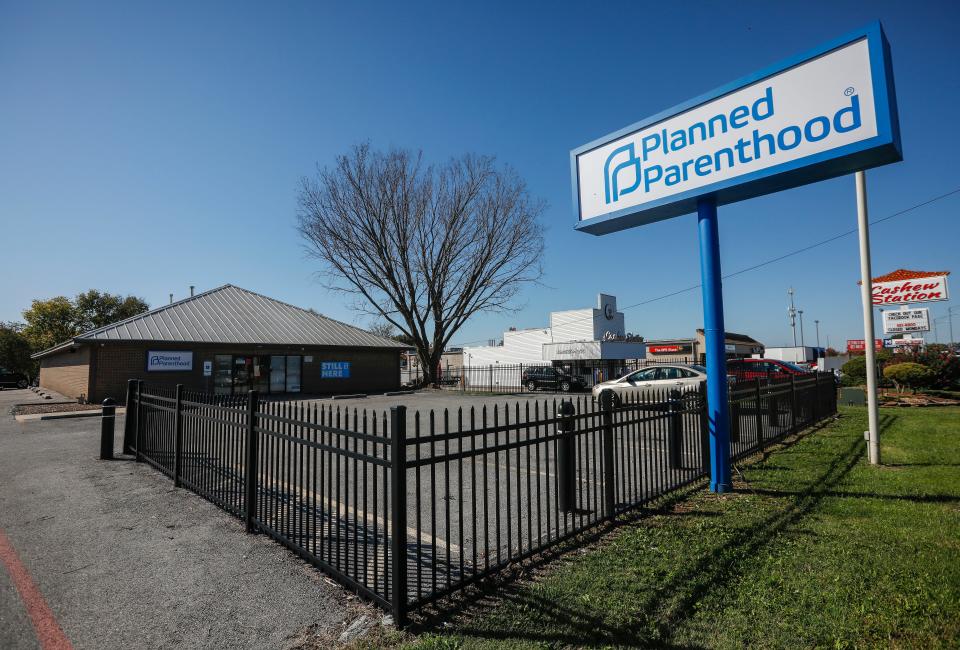Missouri was restricting abortion before Roe v. Wade was overturned. Here's a look at the timeline.
- Oops!Something went wrong.Please try again later.
Abortion is no longer legal in Missouri.
The activation of the state's "trigger law" last week upon the U.S. Supreme Court's overturning of Roe v. Wade was the culmination of years of legislation and politics controlled by Republicans in Jefferson City.
In light of the significant moment, we're taking a look back at some of those most recent efforts, dating back to the passage of that trigger law in 2019. The years since have seen steady attempts to legislate additional restrictions, shut down the state's final abortion clinic, and remain at the tip of the spear in a national hot-button debate.
Missouri bans abortion: 'Trigger law' activates after U.S. Supreme Court overturns Roe v. Wade
2019
January & February: Republicans propose a litany of bills aimed at restricting abortion as they return to Jefferson City in January. Speaker of the House Elijah Haahr, a Springfield Republican, announces he will refer eight of those bills to committees for hearings.
"In Missouri, we stand for the born and we stand for the unborn," he says.
One of those bills is House Bill 126, sponsored by O'Fallon Republican Rep. Nick Schroer, which would ban abortions after eight weeks of pregnancy. It also contained triggers at several other weekly intervals, in the chance that earlier ones are blocked by a court.
At this point, Missouri permits abortion up to 22 weeks into pregnancy, and has one abortion clinic operating in St. Louis. Parental or guardian consent for women under 18 is required. Previous attempts to introduce week-specific restrictions on abortion failed in 2015, 2017 and 2018.
The proposed 2019 bill would not make exceptions for pregnancies caused by rape or incest, only for cases of medical emergency. It would punish doctors who give abortions with up to 15 years in prison and a loss of their license.
HB 126 passes out of committee and the House. Along the way, it is amended by Rep. Adam Schnelting of St. Charles to include a "trigger law," which would ban all abortion except for medical emergencies if the U.S. Supreme Court overturns Roe v. Wade.
May: As the days tick down to the constitutional deadline for the legislative session, Republicans in the Senate pass House Bill 126 by a 24-10 party-line vote, sending it back to the House.
Democrats and advocates continue to condemn the bill. St. Louis Democrat Sen. Jill Schupp called it "an extreme and egregious piece of legislation that puts women's health at risk." Members of the superminority party filibustered the bill for hours before it eventually passed early in the morning.
Planned Parenthood Advocates in Missouri said "politicians are putting the health and lives of Missouri women at risk in their race to make our state the one that overturns Roe v. Wade at the Supreme Court."
The House grants final approval to the bill, on a 110-44 vote. Gov. Mike Parson, a Republican, signs it into law. It is set to take effect in late August.

Weeks later, after the legislative session ends, Planned Parenthood officials say the St. Louis abortion clinic's license is set to expire, and files a lawsuit to block the expiration. Gov. Mike Parson says the state is investigating the facility.
June: A state commission extends the St. Louis Planned Parenthood clinic's abortion license for another month.
July: Planned Parenthood and the ACLU file a federal lawsuit seeking to block the state's eight-week abortion ban.
August: A U.S. District judge blocks the eight-week abortion ban less than a day before it's set to take effect. The block does not apply to the "trigger law" portion of the bill. The state appeals the case.
November: Dr. Randall Williams, director of the Missouri Department of Health and Senior Services, says the department had "calculated" the dates of Planned Parenthood patients' last menstrual periods as part of a patient safety investigation.
A spokesperson for the department said days later that they did not, and denied news reports that Williams kept a spreadsheet to "track" patients' periods. Democrats and Planned Parenthood called it an overreach of government and for an investigation into Williams.
"This unsettling behavior calls into question whether Dr. Williams meets that high standard," House Minority Leader Crystal Quade, a Springfield Democrat, said.
Abortion in Missouri: Protesters rally in downtown Springfield
2020
May: A state judge rules that the state was not justified in attempting to deny Planned Parenthood's license renewal in 2019, allowing the clinic in St. Louis to continue operating.
2021
April: Dr. Randall Williams resigns as state health director.
June: A panel of judges on a federal appeals court upholds the block on the eight-week abortion ban. Planned Parenthood calls it a "critical victory."
Gov. Mike Parson calls a special legislative session, primarily focused on extending a critical tax for funding Medicaid. His call included language focused on banning "abortifacient drugs and devices" from being paid for by the low-income health care program, as well as blocking abortion providers from funding under the Uninsured Women's Health Program.
Legislators pass a "clean" version of the tax without language on abortion or contraceptives. Parson signs it into law.
July: Longtime Illinois health official Donald Kauerauf is appointed state health director by Parson.
September: The federal appeals court announces in a rare move that it will re-hear its decision on the eight-week abortion ban, bringing it before the entire bench of judges. Attorneys for the state zero in on the provision banning abortion in cases where there is prenatal Down syndrome. Planned Parenthood maintains that it is unconstitutional and should be blocked.

A Senate committee drafts a report urging the state to tighten its rules for facilities that receive Medicaid funding, targeting Planned Parenthood.
October: The Department of Health and Senior Services issues new rules tightening inspection requirements for abortion providers, and allowing information from those inspections to be used in a potential shutdown of Medicaid funds to Planned Parenthood.
Planned Parenthood's Springfield and Joplin clinics, which do not provide abortions, rejoin the federal Title X grant program for family planning resources, which they pulled out of during the Trump administration due to rule changes.
Missouri joins a multi-state lawsuit aiming to return to the Trump-era rule changes after the Biden administration rolls them back.
2022
February: Donald Kauerauf resigns as state health director after several hardline senators derail his confirmation process, citing concerns with his encouragement of COVID vaccination and that he was not adequately anti-abortion. Parson called the saga an "embarrassment."
March: Republicans file new abortion bills and amendments. One of them filed by Rep. Mary Elizabeth Coleman of Arnold, modeled after a new Texas law, would allow private citizens to sue those who aid and abet people seeking abortions from crossing state lines.
Another from Branson Rep. Brian Seitz would make performing an abortion after ten weeks of pregnancy a class A felony and would ban mail-order abortion medication. Seitz' bill would have made it illegal in some circumstances to abort a potentially fatal ectopic pregnancy, though that language was removed during the committee process.
Longtime DHSS official Paula Nickelson is named acting state health director, as Parson seeks to avoid another Senate confirmation process.
April: Federal grant money for family planning services through the Title X program is awarded to the Missouri Family Health Council, a nonprofit that has controlled the money for more than 40 years. The Missouri Department of Health and Senior Services applied and lost for the third consecutive year.
The House passes a bill criminalizing mail-order abortion medications and blocking Medicaid funds from going to Planned Parenthood. It includes language from Seitz's bill, which was brought on the floor to block Coleman's attempt to attach her bill as an amendment. It also bans fetal tissue donations, and would also allow for wrongful death lawsuits in rare cases where attempted abortions result in a live birth that is injured or later dies. The bill dies in the Senate when the session ends in May.
May: POLITICO publishes a draft opinion of the U.S. Supreme Court's ruling overturning Roe v. Wade. Missouri politicians and candidates reacted to the news. Many Republicans focused on the leak, criticizing it as damaging to the court. Democrats and abortion rights advocates characterized it an impending crisis for reproductive health care access.
June: Legal abortion is banned in Missouri minutes after the U.S. Supreme Court overturns Roe v. Wade. Attorney General Eric Schmitt, a Republican, signs an opinion activating the 2019 "trigger law," making Missouri the first state to do so. Parson issues a proclamation soon after.
Galen Bacharier covers Missouri politics & government for the News-Leader. Contact him at gbacharier@news-leader.com, (573) 219-7440 or on Twitter @galenbacharier.
This article originally appeared on Springfield News-Leader: A timeline of Missouri's abortion ban, recent legislation and policy

